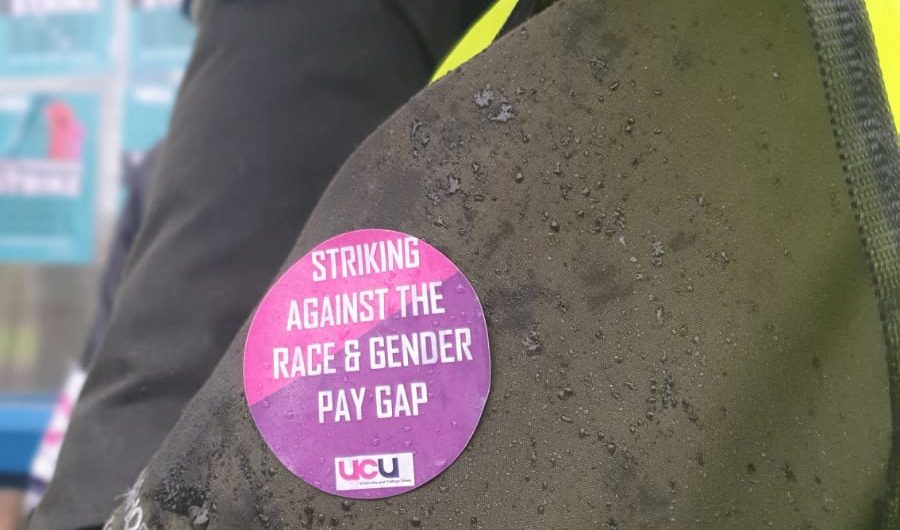In a joint interview, Dr Nadya Ali, Lecturer in International Relations, and Dr Arabella Stanger, Lecturer in Drama, talk to our News Editor Becca Bashford about why they have joined the strikes alongside thousands of other university staff across the country.
Why are you striking?
As members of University and College Union (UCU), we are striking over two interlinked issues: pay, equalities and casualisation; and the USS pensions dispute. As staff members at Sussex, we are deeply worried about the implications of these issues for our students and colleagues – present and future. Every day we see problems with structural inequalities, the erosion of working and studying conditions, and the escalation of staff workloads, all while students are paying more and more just to access education. We feel we have no choice but to take action.
Pay, equalities, workload and casualisation:
- Staff have suffered a pay cut of 17% relative to inflation over the last decade
- Increasing numbers are employed on precarious contracts (described as the ‘Sports Direct’ model for universities)
- BAME staff overall suffer a 9% pay gap
- Staff from a black background suffer a 14% pay gap
- The gender pay gap is 15%, and by some measures has worsened over time
- Workloads mean there is a hidden epidemic of mental health problems among university workers
USS pensions dispute:
- A pension is a worker’s deferred wages, taken up on retirement.
- Following successful strikes in 2018, recommendations for an improved pensions scheme were put forward by a Joint Experts Panel.
- These recommendations were largely ignored by USS.
- A typical USS member stands to be about £240,000 worse off as a result of changes made to the pensions scheme since 2011.
- We are taking strike action to protect our pension, a basic guarantee for our wellbeing in retirement, and to ensure that new generations of staff can stay in the university sector.
What are you hoping to achieve by striking, regarding your personal roles at Sussex but also on a National level?
Locally, we strive to make Sussex a more equal place of employment for all workers. In 2016, a UCU survey on precarious contracts showed Sussex had employed 50.3% of research staff and 42.1% of teaching staff, on precarious contracts. The university was also ranked as the 68th most insecure institution to work at out of 164 that took part in the survey.
Nationally, we fight for the end of exploitative working conditions to be implemented across the whole sector, not just at Sussex. This is why it’s so powerful 60 universities are going on strike. Enough is enough. We are people and not cogs in the machine of the marketised university.
- In 2016, a UCU survey on precarious contracts showed Sussex had employed 50.3% of research staff and 42.1% of teaching staff, on precarious contracts.
- The university was ranked as the 68th most insecure institution to work at out of 164 that took part in the survey.
- Sussex recently signed up to the Race Equality Charter. It has also undertaken work to close the gender and disability pay gaps.
- The strike underlines that this work CANNOT be undertaken without also addressing the conditions of precarity, heavy workloading, and threats to pensions, which disproportionately impact marginalised workers.
This strike is not just about pensions. It has evolved into a dispute about pay and working conditions too: what led to this further deterioration?
This wave of action by HE workers reflects our understanding that all conditions of exploitation in universities – from pensions to casualisation to structural racism – are fundamentally connected. We know that we cannot expect solidarity from workers on issues which affect some (pensions) without offering solidarity on issues that affects others (casualisation, equalities and pay). True solidarity entails a recognition and willingness to fight for each other even when specific problems might not impact on us individually.
The two of us strike as faculty on permanent contracts whose pensions are under threat. But we also strike for our precarious colleagues who do not enjoy the same job security as we do. And we strike as two women, and one of us as a woman of colour, for those who work in even more exploitative conditions than we do. This strike is to ensure life is fairer for the most precarious and vulnerable.
How has Sussex University management dealt with the situation? Could they be doing more?
We encourage University of Sussex management to follow the example of universities across the country by listening to their striking colleagues, and not exacerbating the problems around which we strike. We hope, for instance, our Vice Chancellor Adam Tickell will join Anthony Forster, VC for the University of Essex, in his public acknowledgement that employers can afford to pay more for USS and should be doing more to avoid widespread disruption. We also hope Sussex management will join universities including Essex, Royal Holloway, Durham, and UCL, in staggering the deductions to striking colleagues’ salaries, so that those of us who are most precarious can afford to pay our rent while exercising our right to strike.
What will happen if a satisfactory offer can’t be reached?
If our employers and UUK do not return to the negotiating table with a meaningful commitment to addressing the issues raised by the disputes, there is a likelihood strike action could happen again in 2020.
What would you say to aspiring lecturers and academics who might be put off by the strikes?
Aspiring lecturers and workers of the university are already being put off from a career in the university due to widespread precarity, heavy workloads, casualisation, racism, sexism, and a hidden epidemic of mental health problems. What the strikes signal is a commitment to inter-generational and intra-generational justice between those who have jobs and those who don’t, between those who are permanent and those who are precarious, between those who are marginalised in the university due to their race, gender, disabilities or sexual identity, and those who are not.
This isn’t just a lecturer strike, it’s a workers’ strike too. Do all factions of UCU support each other’s causes?
It is vital to understand this strike is NOT a lecturers’ strike! At Sussex, it is a strike which brings together everyone from associate and doctoral tutors, to workers from the Student Life Centre, Professional Services staff and academic faculty. What is crucial to the success of the strike and reflected in the two ballots over equalities and pensions, is an understanding the problems different workers face are connected. We can’t win a fight on pensions without winning the fight on equalities too.
On a personal note, how has striking impacted your experience as a lecturer at Sussex?
This is the second time we have been on strike since working at Sussex. Strike action has taught us a great deal about how many of the issues staff and students face in universities, are connected. It has also taught us how these structural inequalities disproportionately impact marginalised communities affected by racism, sexism, ableism, homophobia and transphobia.
However, the most important lesson we take from the strike is the life-changing value of working with others in the university – workers or students – in solidarity, to bring about change which benefits all of us. We are happy to say the political education we have gained through struggle has been transformational in a way simply studying theory has not!
Have your students expressed solidarity with the strikes?
We have been deeply moved by how incredibly supportive students have been regarding the strike, despite their own anxieties. They have brought to the strikes an open mindedness and spirit of solidarity that reminds us of why we work at Sussex. Not only have USSU voted in favour of supporting the strikes, but students have also formed their own solidarity networks, organised events generating demands for structural change, been a part of strike organising and been central to how UCU can centre issues of accessibility in this action. Political struggle is a fluid process and we have learnt so much from our students and with our students, without whom the strike would not have the power it does.
What would be your ideal resolution to the strikes?
Our ideal resolution would be for employers and USS to return to the negotiating table over equalities issues and the pensions dispute.
The Badger approached the University of Sussex for comment regarding the issues surrounding the UCU Strikes. A spokesperson responded:
- A UCU survey on precarious contracts showed Sussex had employed 50.3% of research staff and 42.1% of teaching staff, on precarious contracts, making it the 68th most insecure institution to work at out of 164 surveyed. Does the university have any comments on this statistic and working conditions in Sussex generally in relation to the current strike action?
This data is from a report produced in 2016 and should not be used. The University and UCU have been working together on this matter and, in fact, the UCU’s own report welcomed Sussex’s positive engagement on this issue.
- Is the University of Sussex management planning join Anthony Forster, VC for the University of Essex, in his public acknowledgement that employers can afford to pay more for USS and should be doing more to avoid widespread disruption?
We have been consistently upfront and clear with our University community about our financial challenges and we will continue to do so. While a small number of universities may be able to afford this, the vast majority, including us, would find this simply unaffordable.
- If not what are the University of Sussex planning on doing to contribute to the resolution of this action, and to avoid future strike action?
As any resolution will need to come at a national level, our overwhelming focus is on minimising disruption to our students’ education and keeping university services running. For everyone affected, we really hope that a resolution can be found quickly.
- Are Sussex management planning to join universities including Essex, Royal Holloway, and UCL, in staggering the deductions to striking colleagues’ salaries, so that those who are most precarious (such as PhD students, pt workers and those on lower pay scales) can afford to pay basics such rent while exercising the right to strike?




